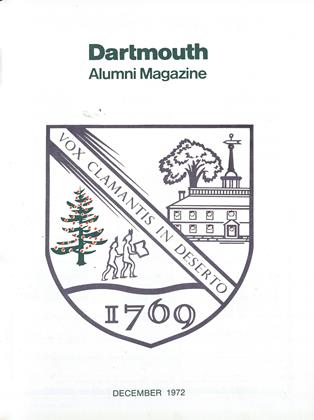NARRATIVE CONSCIOUSNESS: STRUCTURE AND PERCEPTION IN THE FICTION 'OF KAFKA, BECKETT, AND ROBBE-GRILLET.
DECEMBER 1972 DONALD O'HARA '53NARRATIVE CONSCIOUSNESS: STRUCTURE AND PERCEPTION IN THE FICTION 'OF KAFKA, BECKETT, AND ROBBE-GRILLET. DONALD O'HARA '53 DECEMBER 1972
By George H. Szanto'62. Austin: University of Texas Press,1972. 216 pp. $7.50.
A Fulbright Scholar and a Woodrow Wilson Fellow, Mr. Szanto is here concerned with approaching some of the century's most difficult writers through a description of their works' "narrative consciousness," a term by which he generally means the first- person narrator's character as revealed by what he says. The writings of Franz Kafka, Samuel Beckett, and the much lesser Alain Robbe-Grillet seem essentially quite different from earlier fiction—so different that for many recent scholars they seem to require a fresh approach to definition and analysis; they seem to demand to be seen and discussed in totally new ways . . . and perhaps they do. At least, some young scholars—among them Mr. Szanto—have chosen not only to emphasize this novelty in the writers but also to reject from their discussions traditional knowledge about fiction and traditional terms for its discussion, or at least their customary meanings. Stripped bare of academic training and wielding as their only weapon their undiscardable English language, they encounter Kafka and Beckett with warm aplomb.
The reports of their encounters are often fresh and illuminating, like the reports of young people's encounters with life; and they share the same difficulties. Nothing has happened before, in the world of the young, and so all events are equally new, original, and remarkable; commonplaces have the same interest as novelties; clichés seem new and precise; and words are putty in their hands. So when Mr. Szanto tells us that Krapp and his tape-recorder "interact almost not at all," we of an older generation are less than startled; when he tells us that theater equals structure and then asserts that "theater can present. . . several structures simultaneously," we can only look blank. And when we hear that "the theater of intercommunication" (which "stresses discourse as process") "is a dramatic phenomenon emerging in the twentieth century," we may wonder what in hell all that talk was for in Shakespeare's plays.
But there is much to be hoped from the assurance of these new critics. Thanks to criticism, Browning, once a cause of baffled concern for Browning Societies everywhere, is now readable in the high schools; T.S. Eliot's Four Quartets are now studied by students whose forebears thought The WasteLand opaque; and now Beckett's characters, who have appeared to be so learned and intelligent, are about to experience the same sea-change: "His people, if more articulate than the average housewife, are no more conscious," Mr. Szanto assures us. This fine new optimism, reflected also in his observation that "totally to explain the unconscious is as yet impossible" (my italics) promises to bring Kafka, Beckett, and Robbe-Grillet down to the high schools very soon, though not as yet.
A specialist in the problems of structure andperception in Kafka, Beckett, and Robbe-Grillet and in those of narrative consciousness in modern writers, Mr. O'Hara isProfessor of English, The University ofConnecticut.
 View Full Issue
View Full Issue
More From This Issue
-
 Feature
FeatureThe U.S.-Canadian Relationship
December 1972 By JOHN SLOAN DICKEY '29 -
 Feature
FeatureEgyptologist
December 1972 By MARY ROSS -
 Feature
FeatureHall of Hallmark
December 1972 -
 Feature
FeatureClub Officers Hold Annual Meeting
December 1972 -
 Feature
FeatureRugby Posts A Winning Fall Season
December 1972 By TREVOR O'NEILL '73 -
 Article
ArticleFaculty
December 1972 By ROBERT B. GRAHAM '40
DONALD O'HARA '53
Books
-
 Books
BooksAlumni Articles
May 1956 -
 Books
BooksAlumni Articles
JUNE 1965 -
 Books
BooksALUMNI PUBLICATIONS
February, 1922 By L.S H. -
 Books
BooksProselytizers and Profiteers
May 1977 By LEO SPITZER -
 Books
BooksAMERICAN LABOR TODAY (Reference Shelf, Vol. 37, Number 5).
JULY 1966 By ROBERT M. MACDONALD -
 Books
BooksDANCER FROM THE EAST,
December 1947 By WING-TSIT CHAN.



